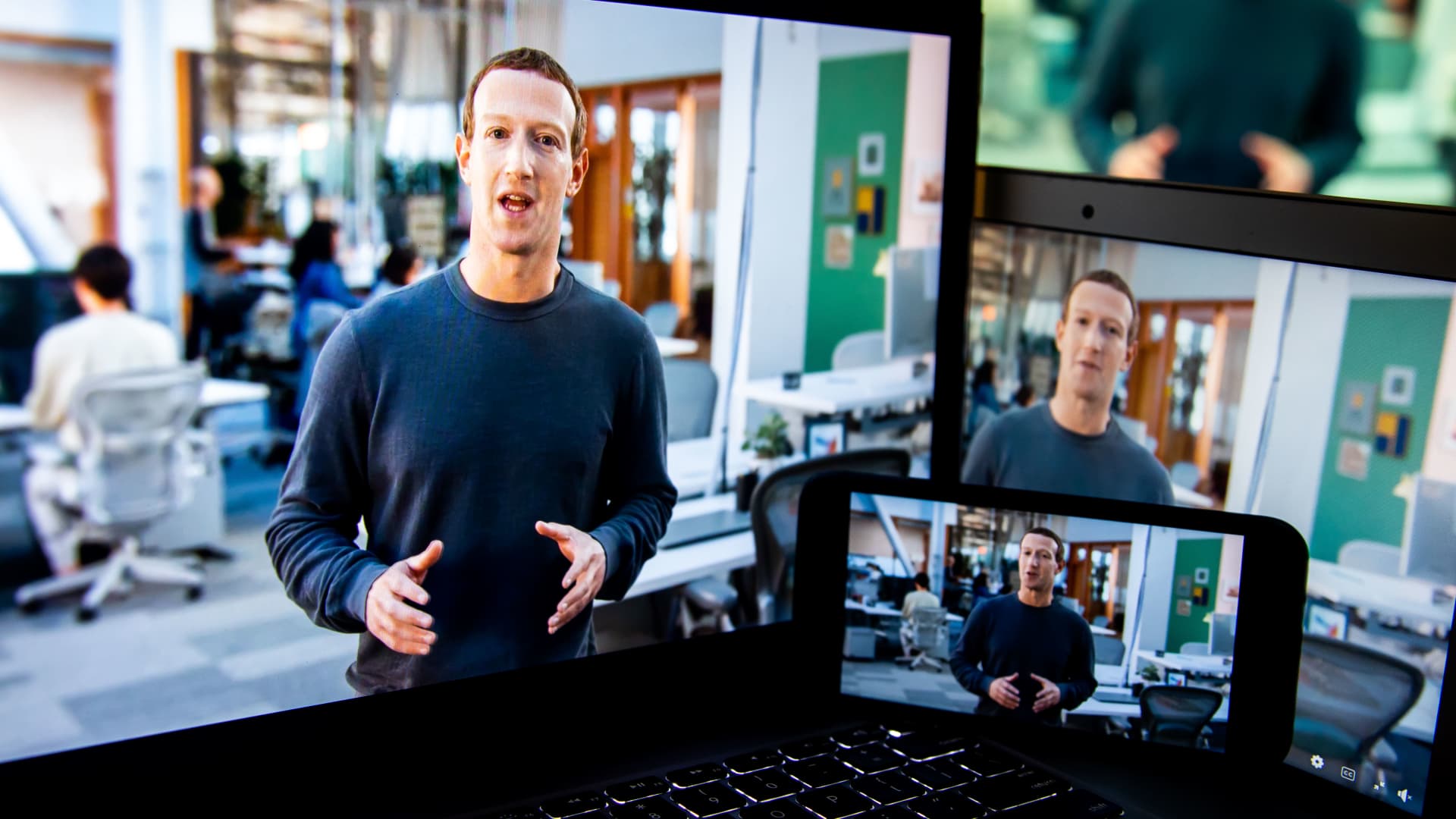Meta suffered a major Facebook ad glitch, clients asking about refunds

Mark Zuckerberg, chief executive officer of Meta Platforms Inc., speaks during the virtual Meta Connect event in New York, US, on Tuesday, Oct. 11, 2022.
Michael Nagle | Bloomberg | Getty Images
Over the weekend, Alex Gorlick experienced what he called the worst Facebook glitch he’s seen in the decade he’s worked in digital advertising.
Gorlick, the CEO of marketing agency Intensify, checked in on one of his client’s accounts on Sunday, and noticed that it had spent 90% of its daily Facebook ad budget by 9 a.m. That meant it had only 10% left for the remaining 15 hours of the day.
He then found that the problem was widespread, spanning his entire customer base. Gorlick said that all those advertisers had essentially just wasted most of their money for the day, spending roughly triple the amount they normally would to acquire a customer.
“The results were horrendous,” Gorlick told CNBC. “It’s the biggest malfunction I’ve ever seen on Facebook ads.”
For brands that are already lowering ad costs to manage through a sluggish economy and a mobile ad market that no longer allows for targeting based on user data, Facebook’s miscue is more than just an unfortunate blip. In low-margin industries, where every dollar counts, it can turn a profitable weekend into a big loser, while also raising further questions about the reliability of Facebook’s ad systems.
A spokesperson for Facebook parent Meta acknowledged there was an ad glitch but declined to provide details or an explanation as to why it happened.
“A technical issue that has now been resolved caused ad delivery issues for some advertisers,” the spokesperson said.
How Facebook ad auctions work
In a typical Facebook online ad auction, a company can allocate a certain amount of money to run ads on the social media service over the course of a day to maximize how many eyeballs see the promotion. It appears that on Sunday the Facebook ad system bundled many more ads than normal into the morning hours, resulting in a highly inefficient day.
Data analytics and marketing firm Varos provided data showing that, of the more than 3,000 ecommerce and direct-to-consumer companies that use its technology, the software bug caused a majority of them to experience a rise in cost per thousand impressions, or what those in the industry call CPMs.
About 36% of companies were “very significantly impacted” by the bug, meaning their CPMs at least doubled, Varos said. Varos CEO Yarden Shaked said another third of companies experienced “significant increases but not like bonkers.”
Shaked said the glitch resulted in a “bidding war for nothing.” He compared it to Costco selling a random toaster that suddenly garnered so much demand that the price spiked way beyond market value.
“Everyone came in in the middle of the night for some reason and started a bidding war over that old toaster,” Shaked said. “You know, it’s completely ridiculous.”
Data about the glitch provided by the advertising technology firm Proxima on 108 companies also revealed that these firms spent their “entire day’s budget in the first few hours of the day,” the company said.
Companies that implemented cost caps, or limits on their advertising campaigns, were not impacted by the glitch, Proxima noted. When companies turned off their ad campaigns because of the bug, some bigger brands took advantage and were able to run successful Facebook ad campaigns throughout the day because of a lack of competition.
Additionally, the Facebook ad bug impacted companies running ads tied to Earth Day.
“The fact that it was Earth Day on Saturday, April 22nd meant that brands running sales for Earth Day were the most impacted like organic, eco-friendly brands focused on Earth Day as a key selling period,” the company said.
Barry Hott, a performance marketing consultant, said that at the time of the bug, the situation for companies running Facebook ads seemed “pretty massive, very painful.”
In retrospect, however, Hott believes the overall impact of the ad error might be “pretty small,” considering in the grand scheme of things, companies occasionally deal with big Meta ad errors that impact their campaigns.
Hott noted that Facebook experienced a major ad glitch a day before Black Friday in 2020 as well as another similar bug earlier that summer.
Refunds?
The main issue for advertisers will be whether they get refunds from Meta because of the glitch, industry experts said.
The Meta spokesperson said the company is “conducting a detailed analysis that assesses opportunities for refunds.”
“We have more information on the refunds process here,” the spokesperson added in a statement.
Because of the glitch, “a bunch of advertisers and business owners had a really s—y day,” Hott said, adding that they will have a “crappy week” as they wonder if they will get refunds and if they do, will it be the full amount they believe they should be owed or chump change.
He recommends that if advertisers have access to a Meta customer support representative — a part of Meta that has been hit by layoffs — they need to ask frequently about refunds, or risk being ignored. Because retailers often make business decisions like how many products they should order or sell based
on their online advertisements, the software glitch could also impact other areas in a company’s business than just merely an increase to their CPMs.
“Basically, no one at the company is going to care about this problem if nobody’s saying anything about it, so they kind of count on advertisers to forget about this in a week or two weeks,” Hott said. “I tell everyone— I’ve had to do this myself — when these issues happen, you know, make a big stink about it.”
Watch: Elon Musk inspired Zuckerberg to reduce Meta’s headcount


















